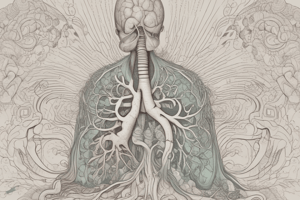Podcast
Questions and Answers
Which of the following are considered normal breath sounds? (Select all that apply)
Which of the following are considered normal breath sounds? (Select all that apply)
- Bronchial or Tracheal (correct)
- Wheezing
- Bronchovesicular (correct)
- Vesicular (correct)
What characterizes vesicular breath sounds?
What characterizes vesicular breath sounds?
Soft, low-pitched fine rustling sounds.
Where can bronchial or tracheal breath sounds be auscultated?
Where can bronchial or tracheal breath sounds be auscultated?
Over the trachea (suprasternal area) and major bronchi.
What indicates bronchovesicular breath sounds?
What indicates bronchovesicular breath sounds?
Inaudible breath sounds can indicate atelectasis or pneumothorax.
Inaudible breath sounds can indicate atelectasis or pneumothorax.
Flashcards are hidden until you start studying
Study Notes
Normal Breath Sounds
- Three main types: Vesicular, Bronchial (or Tracheal), and Bronchovesicular.
Vesicular Breath Sounds
- Characterized by soft, low-pitched, fine rustling sounds.
- Found predominantly over the lung periphery.
- Louder during inspiration; soft or absent during expiration.
- Most common breath sound; decreased intensity may suggest pneumonia, emphysema, pleural effusion, or atelectasis.
Bronchial or Tracheal Breath Sounds
- Identified by loud, high-pitched, tubular sounds.
- Located over the trachea (suprasternal area) and major bronchi.
- Louder and longer during expiration.
- Detection over the periphery may indicate consolidation or atelectasis.
Bronchovesicular Breath Sounds
- Exhibit moderately pitched sounds.
- Found between the scapulae posteriorly and at the 1st and 2nd intercostal spaces (ICS) anteriorly.
- No pause between inspiration and expiration.
- If present over the periphery, may indicate consolidation (lungs filled with exudate).
Inaudible Breath Sounds
- May signify conditions such as atelectasis or pneumothorax.
Studying That Suits You
Use AI to generate personalized quizzes and flashcards to suit your learning preferences.




